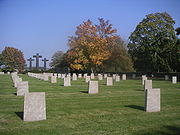
German War Graves Commission
Encyclopedia

It was founded as a private charity on December 16 1919 as the recognised [German] Commission under the war graves provisions of Article 224 of the Treaty of Versailles
Treaty of Versailles
The Treaty of Versailles was one of the peace treaties at the end of World War I. It ended the state of war between Germany and the Allied Powers. It was signed on 28 June 1919, exactly five years after the assassination of Archduke Franz Ferdinand. The other Central Powers on the German side of...
. By the 1930s, the Commission had established numerous cemeteries for German World War I
World War I
World War I , which was predominantly called the World War or the Great War from its occurrence until 1939, and the First World War or World War I thereafter, was a major war centred in Europe that began on 28 July 1914 and lasted until 11 November 1918...
dead. During World War II
World War II
World War II, or the Second World War , was a global conflict lasting from 1939 to 1945, involving most of the world's nations—including all of the great powers—eventually forming two opposing military alliances: the Allies and the Axis...
, the Volksbund's work was mostly carried out by the Wehrmacht
Wehrmacht
The Wehrmacht – from , to defend and , the might/power) were the unified armed forces of Nazi Germany from 1935 to 1945. It consisted of the Heer , the Kriegsmarine and the Luftwaffe .-Origin and use of the term:...
's own graves service.
After World War II, the Volksbund resumed its work in 1946 and soon established more than 400 war cemeteries in Germany. In 1954, the German chancellor Konrad Adenauer
Konrad Adenauer
Konrad Hermann Joseph Adenauer was a German statesman. He was the chancellor of the West Germany from 1949 to 1963. He is widely recognised as a person who led his country from the ruins of World War II to a powerful and prosperous nation that had forged close relations with old enemies France,...
, tasked the Volksbund with the establishment, care and upkeep of German war cemeteries abroad.
Today, it looks after about "827 military cemeteries in 45 countries with about 2 million dead" and its work is carried out today by "almost 10,000 honorary and 536 full-time employees". Now that the Cold War
Cold War
The Cold War was the continuing state from roughly 1946 to 1991 of political conflict, military tension, proxy wars, and economic competition between the Communist World—primarily the Soviet Union and its satellite states and allies—and the powers of the Western world, primarily the United States...
is over, the Volksbund has access to Eastern Europe, where the bulk of World War II
World War II
World War II, or the Second World War , was a global conflict lasting from 1939 to 1945, involving most of the world's nations—including all of the great powers—eventually forming two opposing military alliances: the Allies and the Axis...
German casualties occurred. In the last few years, 190 World War I
World War I
World War I , which was predominantly called the World War or the Great War from its occurrence until 1939, and the First World War or World War I thereafter, was a major war centred in Europe that began on 28 July 1914 and lasted until 11 November 1918...
cemeteries and 300 World War II
World War II
World War II, or the Second World War , was a global conflict lasting from 1939 to 1945, involving most of the world's nations—including all of the great powers—eventually forming two opposing military alliances: the Allies and the Axis...
cemeteries in eastern, central and south-eastern Europe have been reconstructed or rebuilt. About 32 cemeteries are currently under construction or renovation and about 584,000 bodies have been buried in new graves. Germany and Croatia
Croatia
Croatia , officially the Republic of Croatia , is a unitary democratic parliamentary republic in Europe at the crossroads of the Mitteleuropa, the Balkans, and the Mediterranean. Its capital and largest city is Zagreb. The country is divided into 20 counties and the city of Zagreb. Croatia covers ...
signed an agreement on German war graves in that country in 1996.
Everyday maintenance of German war cemeteries in France is looked after by the (the "German Military Burials Maintenance Service") known as S.E.S.M.A..
The German War Graves Commission offers an Online-Service to locate an individual war grave using a database with more than four million entries concerning World War I & II.
List of German cemeteries by country/conflict

Austria - World War I & II
- List of German war cemeteries in Austria :de:Liste von Soldatenfriedhöfen in Österreich
Belgium - World War I
- Vladslo German war cemetery {Total burials: 25,644}
- Langemark German war cemetery {Total Burials: over 44,000}
- Menen German war cemeteryMenen German war cemeteryThe Menen German war cemetery is a military cemetery in the Belgian town of Menen territory and partly in Wevelgem. There were nearly 48,000 German soldiers buried from the First World War, making it the largest in Flanders. In between are several crosses and oak and chestnut trees. In the center...
{Total Burials: 47,864) - Hooglede German war cemeteryHooglede German war cemeteryThe Hooglede German war cemetery is a military cemetery in the Belgian town of Hooglede which contains more than 8,000 buried German soldiers from World War I....
{Total Burials: 8,247}
Belgium - World War II
- Lommel German war cemetery, :de: Soldatenfriedhof Lommel
Canada - World War I & II
- Woodland Cemetery, Kitchener, Ontario (Total Burials: 187)
Croatia - World War II
- Split German war cemetery (Lovrinac)
- Zagreb German war cemetery
France (Western Front) - World War I
- Fricourt German war cemeteryFricourt German war cemeteryFricourt German war cemetery is near the village of Fricourt, near Albert, in the French département of the Somme. Most of the fallen were members of the Imperial German 2nd Army...
(Somme) - Vermandovillers German war cemeteryVermandovillers German war cemeteryVermandovillers German war cemetery contains 22,632 fallen soldiers from World War I. It is located in Somme Département, France and is cared for by the German War Graves Commission.-History:...
, Somme Département - Neuville-St Vaast German war cemeteryNeuville-St Vaast German war cemeteryThe Neuville-St Vaast German War Cemetery is located in Neuville-Saint-Vaast, a small village, near Arras, Pas-de-Calais, in northern France. The cemetery was established by the French in 1919 as a concentration cemetery for German war casualties from the regions north and east of Arras...
(Arras)
France (Normandy) - World War II
- Orglandes German war cemeteryOrglandes German war cemeteryOrglandes War Cemetery is a German World War II cemetery in Normandy, France. It is located on the northern edge of the village of Orglandes, about 25 km west of Bayeux. The burials come from summer 1944, immediately following D-Day and the Battle of Normandy.The entrance is marked by a small...
- Huisnes-sur-Mer German cemetery
- La Cambe German war cemetery
- St-Desir-de-Lisieux German war cemetery
- Marigny German war cemetery :fr:Cimetière militaire allemand de Marigny
- Champigny-Saint-André German war cemetery
- Berneuil German war cemetery :fr:Cimetière militaire allemand de Berneuil
Greece
- Dionyssos-Rapendoza German war cemetery
- Maleme-Crete German war cemetery
Ireland - World War I & World War II
- Glencree German war cemetery (Volksbund Ireland page, in German)
Israel - World War I
- Nazareth German war cemetery :de: Deutscher Soldatenfriedhof in Nazareth
Italy - World War II
- :it: Cimitero Militare Germanico della Futa
Luxembourg - World War II
- Sandweiler German war cemeterySandweiler German war cemeteryThe Sandweiler German war cemetery is a World War II cemetery in Sandweiler, in southern Luxembourg. It contains the graves of 10,913 German servicemen from the Battle of the Bulge in winter 1944 and spring 1945...
Netherlands - World War II
- Ysselsteyn German war cemetery
Russia - World War II
- Krasnogorsk German war cemetery (POWs, near MoscowMoscowMoscow is the capital, the most populous city, and the most populous federal subject of Russia. The city is a major political, economic, cultural, scientific, religious, financial, educational, and transportation centre of Russia and the continent...
- Sologubovka CemeterySologubovka CemeterySologubovka Cemetery is a German war cemetery and the final resting place of over 30,000 German war dead from World War II. Located southeast of St...
Spain - World War I & World War II
- Cuacos de Yuste German war cemetery :es: Cementerio Alemán de Cuacos de Yuste
Tunisia - World War II
- Bordj Cedria German war cemetery, Tunisia :de: Soldatenfriedhof Bordj Cedria
United Kingdom - World War I & II
- Cannock Chase German war cemeteryCannock Chase German war cemeteryThe Cannock Chase German war cemetery is on Cannock Chase, Staffordshire, England.On 16 October 1959, the governments of the United Kingdom and the Federal Republic of Germany made an agreement about the future care of German military personnel and German civilian internees of both World wars...
(looked after by the Commonwealth War Graves CommissionCommonwealth War Graves CommissionThe Commonwealth War Graves Commission is an intergovernmental organisation of six independent member states whose principal function is to mark, record and maintain the graves, and places of commemoration, of Commonwealth of Nations military service members who died in the two World Wars...
) {Total Burials 4,855}

